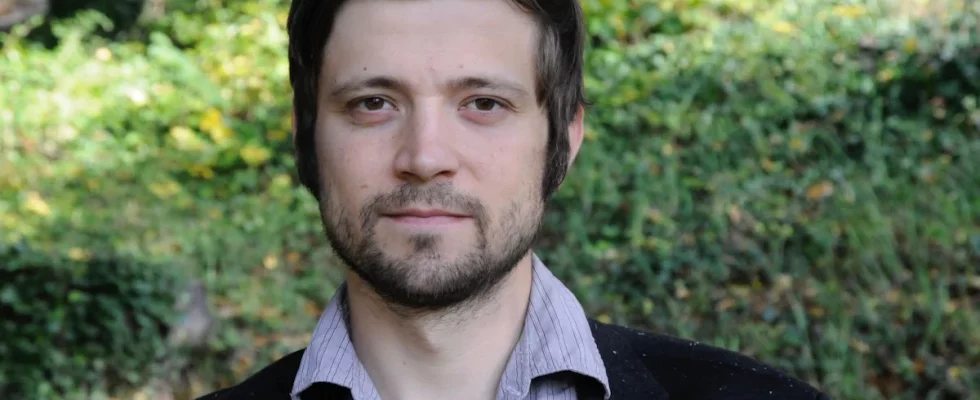It starts with some hollow, woody sounds. Soon they move into a faster rhythm. In a conjuring game, monks let their two hammers dance over a freely swinging, suspended wooden board. You could almost go into a frenzy if it lasted just a little longer. But the monks know: When the wood of the hour sounds, it is time to go to mass.
The poet Alexandru Bulucz, who was born in Alba Iulia, Romania in 1987 and writes in German, still knows these sounds from his childhood. A larger audience has known him since he read in the competition for the Ingeborg Bachmann Prize in Klagenfurt in 2022. And he is involved in PEN Berlin. His much-acclaimed volume “What Parsley Knows About the Soul,” which was published in 2020, already writes about the “toaca,” as the hour board is called in Romanian. “We flew // over wood smoke from monasteries, over liturgical calls from hour drums / from monks, toaca sounds stretched a ladder to heaven / towards us and beyond us,” says the poem “Hour Wood”, which is also very much about his childhood in Romania, as well as a homage to the Chernivtsi poet Rose Auslander. The sounds of the monks drive the poet skyward and at the same time offer him support. In short, they guide him on his path.
In Bulucz’s new, clever volume of poetry, the wood of the hour becomes an image tout court raised for his poetry. The first part, “The Spark of Fury”, leaves no room for misunderstanding: the hammer is not only part of the philosopher’s instruments, but also of the poet’s. Bulucz leads us into his forge, where he only appears to be hitting the anvil in anger – there is hardly a glimpse of fury in these poems. For him, writing poetry means above all hammering. And the hammer, as we have known at least since Nietzsche, is an instrument that can be used for destruction or diagnosis, but also, and perhaps even more, it allows new things to be created.
A connection is created between spirit, smell and lies, regardless of whether it is etymologically correct
Anyone who hammers causes echoes. This is at least one of the principles of his lyrical practice and also determines this volume. Bulucz comes across a word and soon other words sound similar in sound. The poet, who was taught philosophy of language by Werner Hamacher, calls these striking puns paronomasia. “Mintă and minte mean mint or spirit in Romanian,” he writes, for example, in “Mint Spirit” to directly raise the question: “Do they share / an origin, a fleeting touch without phonetic value / at least?”
What we know about the plant is that its smell intensifies in sunlight. And, Bulucz wonders, “Is spirit minty by birth, are its outgrowths adaptations to the climate?” But the poem doesn’t end there. The semantic game is further supplemented in a note: “Close to mintă and minte is also the Romanian word for lying: a minţi.” Regardless of whether it’s all etymologically correct, it’s fun to think about the connections between mind, smell, taste and lies, which when touched by Bulucz suddenly start to sing. So you can also play with hammers.
Anyone who hammers produces echoes and in the poem they don’t just have to be linguistic. Echoes are memories, new sounds that consist of distorted remnants of one’s own past. And there are many personal stories, often connected to his youth in Transylvania, in Alexandru Bulucz’s sometimes melancholic, sometimes funny poems. The cycle “Farewell to Father” is poignant and deals with the relationship, or rather a barely existing relationship, between father and son in thirteen poems. It is a story full of references to Kafka, from whose “Letter to the Father” he removes the first letter, so that only “Called to the Father” remains.
You might think it’s a cheap pun, but not when you know that the relationship between the two was maintained almost exclusively by telephone for years. Blow by blow, Bulucz carves out the impact of postwar Romania on the history of this relationship. Not only does he have his father raise “his still functioning right arm in the German salute,” but he also points to the fascist roots of his intellectual fathers, such as Emil Cioran and Mircea Eliade.
Bulucz doesn’t shy away from commenting on his own poems. The narrative tone that characterizes his work sometimes turns into essayistic. For Bulucz, the boundaries between poem, story and essay are fluid. What he writes, for example, about the furniture in the poems of his role model Paul Celan – who also dedicated a verse to hour wood with “One Hand” in his volume “Sprachgitter” – can hardly be described as a poem. But it is impressive how, in just under a page and a half, in a kind of miniature experiment, he places the table at the center of Celan’s poetics, even though this place is usually assigned to a handshake or a message in a bottle. In Celan it says: “The table, made of hour wood, with / the rice dish and the wine. / There is / silence, eating, drinking. // A hand that I kissed / lights up the mouths”. This is also what the wood of the hours is: not just an instrument with which believers are invited to mass, it creates a place for coming together and even for loving.
Whether it is a great silence that arises there, or a loud laugh about the connections between lies, lightness and light, or a sound ladder that leads to the heavenly – wherever the wood of the hours leads, one is happy to be inspired by Bulucz’s poems Show the way.

